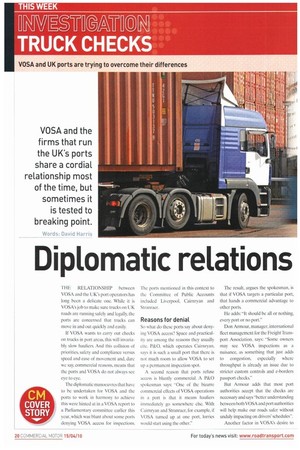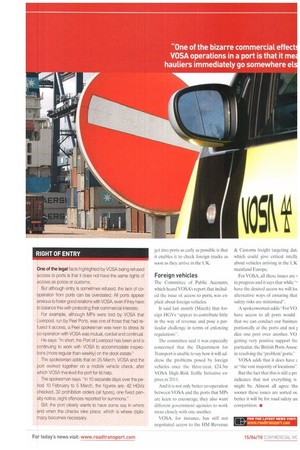iplomatic relations
Page 20

Page 21

If you've noticed an error in this article please click here to report it so we can fix it.
VOSA and the firms that run the UK's ports share a cordial relationship most of the time, but sometimes it is tested to breaking point.
Words: David Harris
THE RELATIONSHIP between VOSA and the UK's port operators has long been a delicate one. While it is VOSA's job to make sure trucks on UK roads are running safely and legally. the ports are concerned that trucks can move in and out quickly and easily.
If VOSA wants to carry out checks on trucks in port areas, this will invariably slow hauliers. And this collision of priorities, safety and compliance versus speed and ease of movement and, dare we say, commercial reasons, means that the ports and VOSA do not always see eye to eye.
The diplomatic manoeuvres that have to be undertaken for VOSA and the ports to work in harmony to achieve this were hinted at in a VOSA report to a Parliamentary committee earlier this year, which was blunt about some ports denying VOSA access for inspections. ihe ports mentioned in this context to the Committee of Public Accounts included Liverpool. Cairnryan and St ra nraer.
Reasons for denial
So what do these ports say about denying VOSA access? Space and practicality are among the reasons they usually cite. P&O. which operates Cairnryan, says it is such a small port that there is not much room to allow VOSA to set up a permanent inspection spot.
A second reason that ports refuse access is bluntly commercial. A P&O spokesman says: "One of the bizarre commercial effects of VOSA operations in a port is that it means hauliers immediately go somewhere else. With Cairnryan and Stranraer, for example, if VOSA turned up at one port, lorries would start using the other." The result. argues the spokesman, is that if VOSA targets a particular port, that hands a commercial advantage to other ports He adds: "It should be all or nothing, every port or no port."
Don Armour, manager, international fleet management for the Freight Transport Association, says: "Some owners may see VOSA inspections as a nuisance, as something that just adds to congestion, especially where throughput is already an issue due to stricter custom controls and e-borders passport checks."
But Armour adds that most port authorities accept that the checks are necessary and says "better understanding between both VOSA and port authorities will help make our roads safer without unduly impacting on drivers' schedules-.
Another factor in VOSA's desire to get into ports as early as possible is that it enables it to check foreign trucks as soon as they arrive in the UK.
Foreign vehicles
The Committee of Public Accounts. which heard VOSA's report that included the issue of access to ports. was explicit about foreign vehicles.
It said last month (March) that kireign HGVs "appear to contribute little in the way of revenue and pose a particular challenge in terms of enforcing regulations".
The committee said it was especially concerned that the Department for Transport is unable to say how it will address the problems posed by foreign vehicles once the three-year. £24.3m VOSA High Risk Traffic Initiative expires in 2011.
And it is not only better co-operation between VOSA and the ports that MPs are keen to encourage. they also want different government agencies to work more closely with one another.
VOSA. for instance, has still not negotiated access to the HM Revenue
& Customs freight targeting datt which could give critical intellit about vehicles arriving in the UK mainland Europe.
For VOSA. all these issues are in progress and it says that while "I have the desired access we will alternative ways of ensuring that safety risks are minimised".
A spokeswoman adds: "For VG have access to all ports would that we can conduct our businesi portionally at the ports and not dice one port over another. VO getting very positive support fro particular. the British Ports Associ in resolving the 'problem' ports."
VOSA adds that it does have at "the vast majority of locations".
But the fact that this is still a prc indicates that not everything is might be. Almost all agree tha sooner these issues are sorted ou better it will he for road safety an competition. •
































































































































